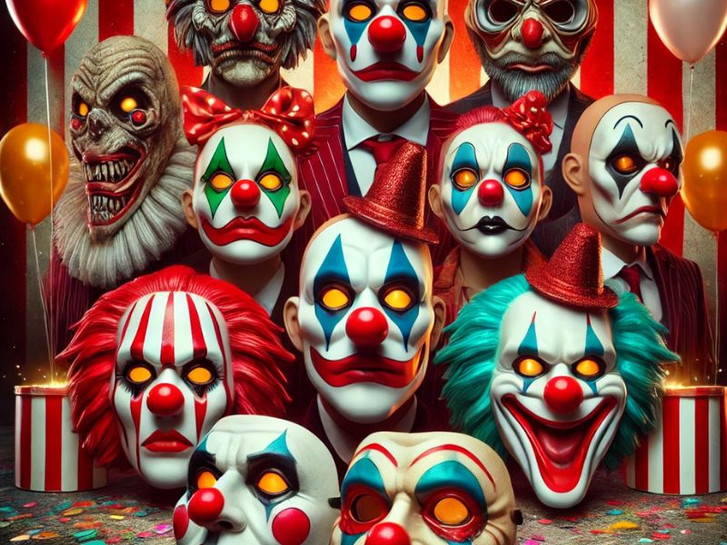Why Clowns Wear Masks & Are Scary
Clowns have been a part of our culture for centuries, initially bringing joy and laughter. However, their image has dramatically shifted over time. Once seen as jovial jesters, clowns are now often associated with fear and unease. This transformation is largely due to their creepy clown masks and unsettling appearances in popular media. But why do clowns wear masks? And why are they scary to some people? Let’s explore the dark history of clowns to understand this phenomenon.
The Origin of Clown Masks
The tradition of clowns wearing masks dates back to ancient times. In ancient Greece and Rome, actors would wear masks during comedic performances, marking the beginning of what we now recognize as clowning. These exaggerated masks amplified emotions and expressions, making them easily visible even from a distance.
By the 16th century, the Commedia dell'arte introduced Harlequin, a mischievous servant who often wore a mask or painted face. This tradition continued into the 19th century, where circus clowns wore heavy makeup or masks for dramatic effect.
Creepy Clown Masks: A Modern Phenomenon
The association between clowns and fear is relatively recent. The term "coulrophobia" (fear of clowns) only emerged in the late 20th century. During this time, creepy clown masks began to gain popularity.
A major factor in this shift is how clowns have been portrayed in popular culture. Stephen King's novel It, featuring Pennywise the Dancing Clown, played a significant role in cementing this fear. Pennywise’s eerie clown mask became an iconic symbol of horror.
Additionally, real-life incidents like John Wayne Gacy—a serial killer who performed as Pogo the Clown—further contributed to the growing fear of clowns. These events helped drive the rise of creepy clown masks, especially around Halloween.
The Psychology Behind Why Clowns Are Scary
To understand why clowns evoke fear, we turn to psychology. The uncanny valley theory suggests that humanoid figures which imperfectly resemble human beings can provoke feelings of eeriness and discomfort. Clown masks, with their exaggerated features and fixed expressions, fall into this category.
Furthermore, the mask or makeup hides the clown’s true emotions, creating an unpredictable aura. This uncertainty can trigger anxiety, making clowns appear unsettling.
The Dark History of Clowns
The dark history of clowns isn’t a recent development. Even in their early days, clowns weren’t solely figures of fun. In many cultures, they served dual roles—both as entertainers and as social commentators.
For instance, in Native American tribes, clowns often acted as spiritual intermediaries or addressed serious social issues using humor. They broke societal norms without facing retribution.
In medieval Europe, jesters were licensed fools who had the unique ability to criticize the ruling class under the guise of humor. Their role was more than just entertainment—it involved providing sharp satirical commentary on politics and society.
Conclusion: Why Clowns Are Scary
Why do clowns wear masks? The answer lies in a centuries-old tradition of performance art where exaggerated facial expressions were key to their role. The more recent fear surrounding creepy clown masks, however, can be traced to portrayals in popular culture and chilling real-life events.
By understanding the dark history of clowns, we gain insight into why some people find them terrifying. From their early days as social critics to their more modern-day roles as figures of horror, clowns have always had an element of unpredictability and subversion. It’s this ambiguity, along with their masked expressions, that can create an unsettling feeling for many.
Whether you find clowns delightful or dreadful, their significant impact on our culture and collective psyche is undeniable.
Shop creepy clown masks and Halloween decorations for the ultimate scare.

